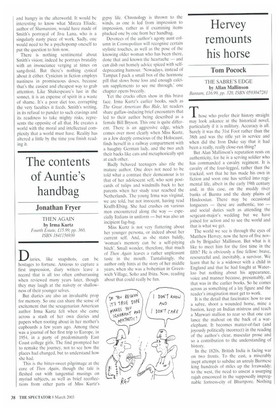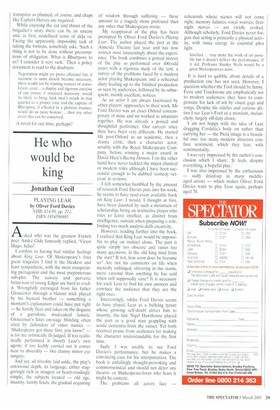Hervey remounts
his horse
Tom Pocock
THE SABRE'S EDGE by Allan Mallinson
Bantam, £16.99, pp. 320, ISBN 0593047281
Those who prefer their history straight may look askance at the historical novel, particularly if it is military. Accuracy is all. Surely it was the 31st Foot rather than the 38th and was the rifle yet in service and when did the Iron Duke say that it had been a really, really close-run thing?
But Alan Mallinson's reputation rests on authenticity, for he is a serving soldier who has commanded a cavalry regiment. It is cavalry of the four-legged, rather than the tracked, sort that he has made his own in fiction and soon one has settled into regimental life, albeit in the early 19th century and, in this case, on the muddy river banks of Burma and the dusty plains of Hindoostan. There may be occasional longueurs — these are authentic, too — and social duties such as attending the sergeant-major's wedding but we have joined for action and to see the world and that is what we get.
The world we see is through the eyes of Matthew Hervey, now the hero of five novels by Brigadier Mallinson. But what is it like to meet him for the first time in the fifth? He is obviously a fine fellow: brave, resourceful and, inevitably, a survivor. We learn that he is a widower with a child in England and that he had fought at Waterloo but nothing about his appearance, voice and manner because, presumably, all that was in the earlier books. So he comes across as something of a lay figure and the reader's imagination must get to work.
It is the detail that fascinates: how to use a sabre, shoot a wounded horse, mine a bastion, keep an Indian mistress and teach a Marwari stallion to rear so that one can lance the mahout on the back of a warelephant. It becomes matter-of-fact (and joyously politically incorrect) in the reading of the author's clear, muscular prose and so a contribution to the understanding of history.
In the 1820s, British India is facing war on two fronts. To the east, a miserably inept attempt to subdue an unruly Burmese king hundreds of miles up the Irrawaddy: to the west, the need to unseat a usurping rajah ensconced in the supposedly impregnable fortress-city of Bhurtpore. Nothing transpires as planned, of course, and chaps like Captain Hervey are required.
While enjoying the cut and thrust of the brigadier's story there can be an uneasy and, at first, undefined sense of deja vu. Facing the apparently impossible task of taking the fortress, somebody asks, 'Such a thing is not to be done without presumptions of obligation. What is Bhurtpore to us? I consider it very rash: Then a policy document is read to the doubters:
Negotiation might yet prove effectual but, if recourse to arms should become necessary, there would not be wanting sources of consolation, since ... a display and rigorous exercise of our power. if rendered necessary, would be likely to bring hack men's minds in that quarter to a proper tone and the capture of Bhurtpore, if effected in a glorious manner, would do us more honour ... than any other event that can be conceived.
A novel for our time, perhaps?



































































 Previous page
Previous page